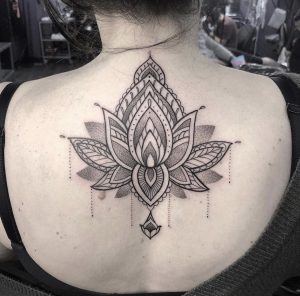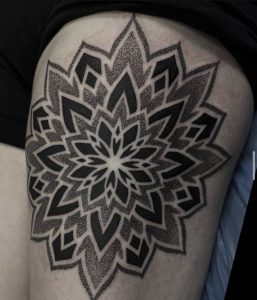Spiritual Symbols in Tattooing – Part I
When the world feels upside down and we become more acutely aware not only of the fundamental uncertainty of things but also of our own mortality, humans often turn to the bigger questions. What is truly important? What kind of support system do I subscribe to, do we believe in a realm beyond what I perceive with my senses, or is this it? And, of course, where am I going to place my next tattoo?
If you are a person who is interested in all of the above, not necessarily because you think you have answers, but because you are asking the questions, then chances are you have an inclination to externalise those questions, portraying some of your beliefs on your skin. Or perhaps you just really the aesthetics of it. This series of posts takes a look at some of the more common symbols of spirituality people tend to incorporate into their body art.
Lotus
The lotus is a powerful symbol in eastern spiritual traditions. It serves as a symbol of purity, triumph over obstacles, and enlightenment. The lotus flower grows in deep mud, far away from the sun. However, sooner or later it reaches the light and blossoms.

Thus, it is considered indicative of the potential of the human condition, as even though it may grow in muddy waters (suffering, confusion and ignorance) it can rise to the surface and produce the most beautiful flowers (enlightenment). Legend has it that everywhere the baby Buddha stepped, a lotus flower bloomed.
According to Lion’s Roar, in Buddhism, different-coloured lotuses have different meanings. The white lotus represents purity and spiritual perfection. The red lotus represents love and compassion, while the blue, always depicted partially opened, stands for wisdom and intelligence. Complete attainment of enlightenment is symbolised by a fully opened gold lotus. Something to take into consideration when planning your piece.
Mandala
The mandala has been used as a meditative technique by Buddhist monks for centuries. It is also represented in Hinduism, as well as in Christian artwork, where it is found in rose designs in stained glass windows in churches.
Even though a mandala may have features such as squares or triangles, it is always concentric in nature. In fact, the very word “mandala,” which comes from Sanskrit, means circle. They are meant to represent balance, harmony and perfection, and represent an imaginary palace that is contemplated during mediation.
Buddhist monks sometimes perform elaborate ceremonies constructing mandalas out of colourful sand. These transient works of art take several days to complete and are thought to transmit positive energies and healing properties to those who see them. Millions of grains of coloured sand are used to create elaborate patterns. The metal funnels used by the monks create a vibration that makes the sand look more like liquid as it pours onto the platform.

The most powerful teaching of the mandala ceremony, however, comes at the very end. No sooner have the monks completed the design than one of them begins to destroy it. The immediate destruction of something so painstakingly created is to serve as a reminder of the impermanence of all things, including life.
Thankfully, the meticulous work that your tattoo artist puts into making yours will last a little longer. Not that we won’t all have to give up our physical bodies at some point in time. And the ink we have collected along with it. That doesn’t mean we shouldn’t adorn it while we have the chance.
